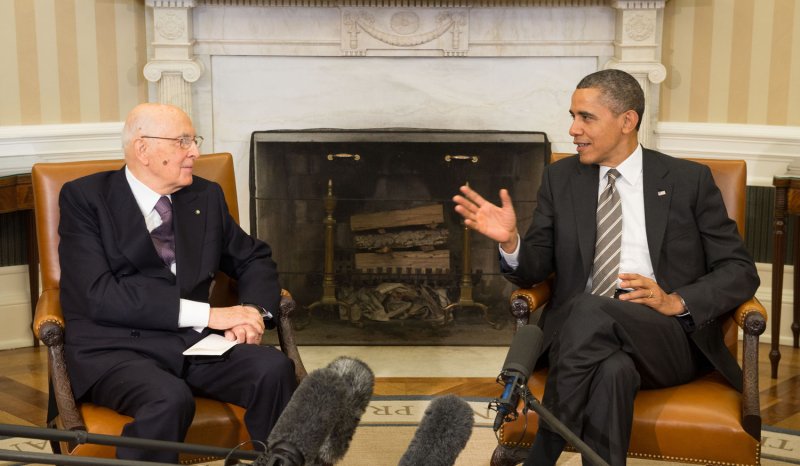U.S. President Barack Obama (R) and Italian President Giorgio Napolitano (L) at the White House in Washington, Feb. 15, 2013. UPI/John Harrington/Pool |
License Photo
WASHINGTON, Feb. 15 (UPI) -- U.S. President Barack Obama Friday called Italian President Giorgio Napolitano "a visionary leader" who has helped promote "greater unification" for Europe.
Speaking with reporters at the White House, where the two leaders met Friday, Obama said Napolitano has been "an extraordinary leader not just in Italy but also in Europe."
"We've had occasion to meet many times in which we have expressed again and again the importance of the transatlantic relationship, and the deep and abiding friendship and connection and bond between the Italian people and the American people," the U.S. president said.
Obama thanked "the people of Italy for their enormous contributions to the NATO Alliance" and noted that Italy is "one of our biggest contributors in Afghanistan, and makes enormous sacrifices."
"The economic bonds between our two countries are very significant," Obama said. "And in all this, President Napolitano has shown himself to be a visionary leader who has helped to guide and steer Europe towards greater unification, but always with a strong transatlantic relationship in mind."
The White House meeting came two days after the European Union and the United States announced they will hold talks on an overarching transatlantic free-trade deal.
The EU said Wednesday an agreement -- first announced Tuesday in Obama's State of the Union address -- would be the mos5t comprehensive bilateral trade deal in history.
Napolitano, who is preparing to leave office, said the EU announcement suggests the prospect of "a new wave of development of technologic advancement of social justice on both shores of the Atlantic."
"And I think it can represent even something more," he said. "It is to say a new historic stage in relations between Europe and the United States -- not only economically, but also from a political and moral point of view."















